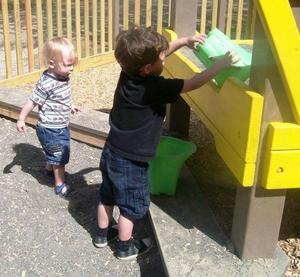The first time someone directed the big A-word at my child, I was insulted, to say the least. My son was leaving milestones in the dust from the moment he was born. I found the idea of him having autism laughable at best. However, as time passed and baby grew into toddler, I started reevaluating my opinion. Many parents assume a child who is autistic is slow or behind, and in all cases that just isn’t true. One form of autism in particular is generally the exact opposite. Asperger’s syndrome is an autistic disorder commonly considered mild autism or high-functioning autistic. The twist is children with Asperger’s syndrome are not behind. Quite the opposite actually, they exhibit advanced development in specific areas but suffer from social interaction issues. After my curiosity was peaked, I found my husband and his grandfather both had Asperger’s, and I personally had many characteristics as well. Genetic predisposition being the current forerunning theory on what causes Asperger’s syndrome, I suddenly found the diagnosis far less inconceivable for my child.
What signs might a toddler with Asperger’s syndrome exhibit?
Asperger’s is most effectively treated when recognized at an early age. Some children won’t show signs of the disorder until after age 3, while others will show subtle signs even in the infant stage.
Signs of Asperger’s syndrome in toddlers include:
-A strict desire for routine. For example, my toddler wouldn’t eat his lunch unless he sat in the same seat, in the same location in our home. He would even become upset if a different cartoon than what was normally playing as he ate lunch came on.
-Seems awkward in social situations. Your toddler may have difficulty imitating play. They also may not make an effort to make friends or play with other children preferring to play alone. My son would follow kids around at the park watching them. This is common in kids with Asperger’s as they attempt to learn how to be social. Some toddlers will form strong relationships with individuals, choosing people so to speak, but not be able to properly interact with others. They may throw things at people, be very rude, or overly friendly in an attempt to be friends because they lack the understanding to learn normal social manners.
-Has an unusual interest in patterns and numbers. If your toddler enjoys lining toys up in a row rather than playing with them, or is particularly fond of numbers on things such as clocks, this can be an indicator of Asperger’s.
-Become obsessed with certain activities/items.
-Has advanced verbal skills, but may repeat phrases or fixate on oneself. Toddlers with Asperger’s can often be mistaken for being spoiled or selfish as they tend to focus on themselves. Their interest in pattern leads them to repeat phrases often. As they age, they may develop on odd way of speaking, or a monotone sound; despite this, those with Asperger’s syndrome generally are highly advanced verbally with verbose vocabularies and above average intelligence. They may, however, suffer in mathematics and abstract thinking being very, very literal.
-Is clumsy, shows poor gross motor skills, or exhibits repetitive movements. While my son always had great motor control as an infant, he’d twitch his fingers repeatedly. As a toddler, he wiggles his foot. Children with Asperger’s syndrome aren’t usually what you’d call athletes. They lack coordination and can develop irregular ways of walking.
-Avoids eye contact, shows little facial expression and/or seems un-empathic.
-Tantrum in reaction to over-stimulation.
What should I do if I suspect my child may have Asperger’s syndrome?
Many of the above signs can be a part of normal toddler behavior. This is why diagnosing Asperger’s syndrome can be difficult at an early age. If you suspect your child may have this disorder, it’s best to bring it up with your pediatrician.
How is Asperger’s syndrome treated?
There is no cure for Asperger’s syndrome. Simply understanding your child is developmentally different (which does not make them mentally challenged or somehow behind other children by the way) can go a long way in reducing tantrums and improving future quality of life. The most important thing for toddlers with Asperger’s is social interaction. They need to be given a great deal of opportunity to interact and will need to be worked with to understand emotions, social mannerisms and friendship. In severe cases, you may be recommended to a psychologist or even given medication to handle stimulus and reduce tantrums or fits.
You may also enjoy:
Normal Toddler Obsessions What to Do About Them
Giving Into Toddler Tantrums or Crying: Why the Pay-Off Doesn’t Cover the Price
6 Toddler Park Problems and How to Solve Them
Sources:
http://www.asperger-advice.com/asperger-syndrome-and-children.html
http://psychcentral.com/lib/2007/symptoms-of-aspergers-disorder/
